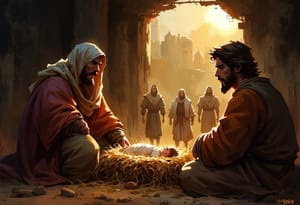| Series | Living with the Romans |
|---|---|
| Theme | 1. At the time of Jesus - I taimi o Iesu |
| Colour | Lanu Auro |
Scripture Focus: Luka 2:1-7
Now in those days, a decree went out from Caesar Augustus that all the world should be enrolled. This was the first enrollment made when Quirinius was governor of Syria. All went to enroll themselves, everyone to his own city. Joseph also went up from Galilee, out of the city of Nazareth, into Judea, to the city of David, which is called Bethlehem, because he was of the house and family of David; to enroll himself with Mary, who was pledged to be married to him as wife, being pregnant. While they were there, the day had come for her to give birth. She gave birth to her firstborn son. She wrapped him in bands of cloth, and laid him in a feeding trough, because there was no room for them in the inn.
- Luke 2:1-7 (WEB)
Study:
This passage sets the scene for the birth of Jesus, placing it firmly within the political landscape of the Roman Empire. Caesar Augustus, the most powerful man in the world at the time, issues a decree for a census – a headcount of the population. This wasn’t about benevolence; it was about efficient taxation and control. Joseph and Mary, ordinary citizens, are compelled to travel to Bethlehem to comply with this order. Their journey highlights the power dynamics of the time. They were subject to the authority of Rome and had to obey its laws, even while pregnant. The irony is powerful: the King of Kings is born under the authority of a worldly emperor. The lack of room at the inn speaks to the lowliness of Jesus' birth; He wasn’t born into privilege, but into simple, even difficult circumstances. The manger, a feeding trough for animals, signifies this humble beginning.
Application:
We often talk about ‘following your heart’ or ‘doing what feels right,’ but this passage reminds us that we live within systems of power and authority, both secular and spiritual. Sometimes, obeying these authorities feels inconvenient, or even unjust. Yet, God often works within, and sometimes *through*, these very structures. Similarly, just because something is powerful or impressive doesn't mean it is good. Caesar Augustus held immense power, yet his decree indirectly led to the fulfillment of God’s plan. We must be discerning, recognizing the powers that be while remaining faithful to a higher authority – God Himself. It also reminds us that God often chooses the humble and the overlooked to accomplish His purposes.
Reflection Questions:
- How do the systems of power in our society today impact our lives?
- In what ways can we navigate these systems with integrity and faith?
- What does it mean to submit to authority while still remaining true to our beliefs?
- How does the humble birth of Jesus challenge our expectations of what a ‘savior’ should look like?
Prayer:
Lord, we acknowledge that you are sovereign over all. Help us to understand the powers that be and to navigate them with wisdom and grace. Remind us that true power comes from you, and that you often use the humble and the unlikely to accomplish your purposes. Help us to remain faithful to you, even when it is difficult, and to seek your will above all else. Amen.
Tags:Luke 2, Caesar Augustus, Bethlehem, Roman Empire, Census, Jesus’ Birth, humility, authority, power, God’s plan, Mary, Joseph
